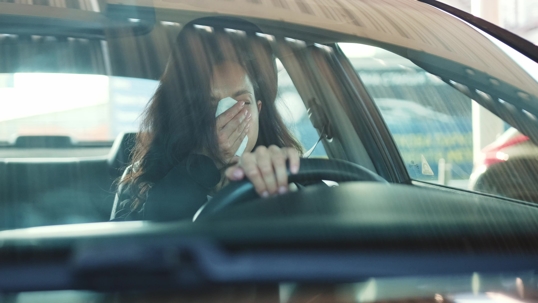Imagine this: You're driving down the road on a sunny spring day, and everything seems fine—until a sudden sneeze forces your eyes shut for one crucial second. Your car has drifted slightly out of the lane, and traffic ahead is slowing down. You quickly snap back to attention, heart racing, but what happens if you don't recover in time?
This is a reality many drivers face during allergy season. While most of us think of sneezing or itchy eyes as minor annoyances, these allergy symptoms can have serious consequences behind the wheel. For some, it can even lead to distracted driving accidents. If you’ve been injured in an accident caused by a distracted driver whose seasonal allergies may have impaired you, here’s what you need to know about the connection and your legal rights.
How Seasonal Allergies Affect Driving
Seasonal allergies—triggered by pollen, dust, and other airborne allergens—don’t just make you miserable; they can also impair your driving ability. Here’s how:
1. Sneezing Attacks
When you sneeze, your muscles contract, and your eyes automatically close for about half a second. While this may not seem like a long time, at 60 mph, your car will travel the length of a basketball court while you're essentially driving blind. Multiple sneezes in a row increase the odds of losing control or missing a critical change on the road.
2. Watery, Itchy Eyes
Allergies often cause your eyes to water or itch, making it harder to see clearly. If a driver instinctively rubs their eyes mid-commute, they’ve removed one—if not both—hands from the steering wheel.
3. Drowsiness From Medications
Many over-the-counter allergy medications, such as antihistamines, list drowsiness as a side effect. This can lead to slowed reaction times, poor concentration, and even falling asleep at the wheel.
4. General Distraction
Persistent coughing, runny noses, and the frequent need to wipe or blow your nose also divide a driver’s attention. Accidents can easily happen when a driver is more focused on their discomfort than the road.
The Legal Implications for Accident Victims
Negligence is the key issue regarding personal injury cases involving accidents caused by seasonal allergies. Here's how it plays out legally:
1. Negligence Doesn’t Excuse Allergies
Allergies aren’t a free pass for careless driving. All drivers are legally responsible for operating their vehicles safely, even if they’re not feeling their best. If a driver’s allergy-related distraction led to the accident, they could still be liable for damages.
2. Proving Distracted Driving
If you've been injured in an accident caused by someone dealing with allergy symptoms, proving their distraction is vital. Evidence like witness statements, police reports, or even traffic camera footage showing unusual driving behavior can be used to build your case.
3. Shared Fault and Compensation
Sometimes, the at-fault driver (or their insurance company) might argue that the crash wasn’t entirely their fault—especially when allergies are involved. This is why having an experienced personal injury lawyer is critical. They’ll help gather evidence to establish fault, ensuring you get the compensation you deserve for medical bills, lost wages, and other damages.
What You Can Do If You’ve Been Injured
If you’ve been the victim of a distracted driving accident, it can feel overwhelming. Dealing with medical appointments, insurance adjusters, and legal complexities isn’t easy, but taking these steps can make a huge difference:
1. Seek Medical Attention Immediately
Getting checked out by a doctor should be your top priority after an accident, not just for your health but also to document any injuries in your case.
2. Document Everything
If it's safe, take photos of the accident scene, vehicle damage, and your injuries. Keep copies of medical records, police reports, and communication with the at-fault driver’s insurance.
3. Contact a Personal Injury Attorney
Navigating the legal system alone can be intimidating. An experienced attorney will evaluate your case, handle negotiations with insurance companies, and fight to secure the compensation you’re entitled to.
Preventing Allergy-Related Distracted Driving
If you're currently struggling with allergies, here are some tips to help reduce the risks of distracted driving:
1. Take Non-Drowsy Medications
Always choose allergy medications that are labeled "non-drowsy" if you plan to drive. This will help keep you alert and focused.
2. Keep Kleenex Handy
Have tissues nearby so you don’t have to scramble while driving—and pull over if sneezing or wiping your nose becomes overwhelming.
3. Use Sunglasses to Protect Your Eyes
Sunglasses can reduce exposure to pollen and ease eye irritation, especially on windy days.
4. Consider Alternative Transport
On days when your allergy symptoms are at their peak, it might be best to consider carpooling, public transportation, or ride-sharing apps to avoid the risks altogether.
New Hampshire Car Accident Attorneys
If you’ve been injured in a distracted driving accident, you don’t have to handle the fallout alone. Partnering with a skilled personal injury attorney can help you hold the at-fault driver accountable and secure the compensation you need to rebuild your life. At Upton & Hatfield, LLP, we have a team of experienced car accident attorneys who are dedicated to fighting for the rights of accident victims. Contact us today at (603) 716-9777 to schedule a free consultation and learn more about how we can help. Don't let allergies or other distractions take away from safe driving practices. Stay vigilant and stay safe on the roads.

